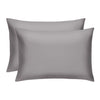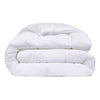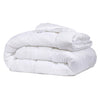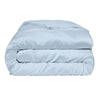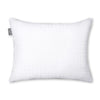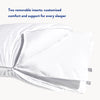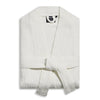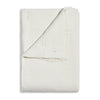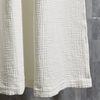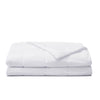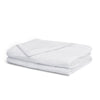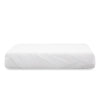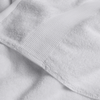The Daily Miracle
What Does Spraying Alcohol On Bed Sheets Do?
Published
July 26, 2025
Author
John Tsenekos

What if there was a quick way to freshen up your bedding between washes? Some people swear that spraying alcohol is a quick and effective way to refresh bed sheets. But does it get rid of allergens and germs? What does spraying alcohol on bed sheets do? And is it a safe, effective option to keep bedding smelling and feeling fresh for longer? If you’re curious about the pros and cons of spraying alcohol on sheets, how it works, and tips for disinfecting your bedding the right way, this guide answers all that, plus more.
Why Do Bed Sheets Need Cleaning?
Your bed sheets are essential for creating a cozy sleep space. They’re the fabric layers covering your mattress and act as a barrier between you and your bedding. Made from materials like cotton, linen, silk, or synthetic blends, sheets aren’t just about comfort. They’re essential for keeping things hygienic. Over time, your sheets collect dead skin cells, sweat, body oils, dust mites, and allergens. If left unchecked, this buildup can trigger allergies, skin irritation, or even allow bacteria and fungi to grow. So, keeping your bed sheets clean isn’t just about feeling good; it’s also crucial for your health and quality sleep!
What Are the Benefits of Disinfecting Bed Sheets?
-
Removes harmful microorganisms: Disinfecting sheets gets rid of bacteria and viruses from sweat, skin, and your surroundings, promoting hygiene and reducing the risk of infections.
-
Minimizes allergens: It significantly lowers allergens like dust mites and pet dander, helping with respiratory issues and allergy symptoms, especially for sensitive folks.
-
Tackles odors: Say goodbye to bad smells caused by bacterial buildup. Disinfecting leaves your sheets smelling fresh and inviting.
-
Preserves fabric quality: Getting rid of microorganisms that degrade fabric fibers helps your sheets last longer and saves money in the long run.
-
Boosts sleep quality: Clean and fresh sheets make for a more relaxing sleep environment, helping you get deeper, more restorative rest.
Why Is It Important to Know How Alcohol Affects Different Sheet Materials?
If you’re thinking about using alcohol to disinfect your bed sheets, it’s important to know how it might react with the material. Alcohol, like isopropyl or ethyl alcohol, can be effective in some cases, but it doesn’t work well with every type of fabric. Delicate materials such as silk, acetate, or rayon can become discolored, shrink, or even get damaged when exposed to alcohol. Always check your sheet’s care label before using alcohol, and if you’re not sure, test a small, hidden area first. This way, you can avoid accidentally ruining your sheets.
What Does Spraying Alcohol On Bed Sheets Do?
Spraying alcohol on bed sheets can be a handy way to disinfect them quickly. Alcohol is great at breaking down bacteria and viruses, killing them on contact. It also helps get rid of odors from sweat and body oils, leaving your bed smelling fresher. Plus, alcohol dries fast, so your sheets won’t stay damp for long, way quicker than a full wash. While it doesn’t replace regular laundering, it’s a good backup for refreshing and sanitizing your sheets between washes.
Does the Type of Alcohol Affect How Well It Disinfects Bed Sheets?
Absolutely! Both the type and concentration of alcohol matter if the goal is to disinfect bed sheets. Isopropyl and ethyl alcohol are common choices, but for the best results, you should stick with a 70-90% concentration. This range is ideal because it kills germs effectively without evaporating too fast. Lower concentrations might not do the job properly, while higher ones evaporate before they can be fully effective. If you’re using denatured alcohol, double-check that the additives won’t stain or damage your fabric before spraying.
Does Spraying Alcohol on Sheets Really Eliminate Dust Mites and Allergens?
Spraying alcohol can help cut down on dust mites and reduce allergens, but it’s not a complete solution. Alcohol kills dust mites on contact, but it doesn’t reach deeper layers of bedding or the mattress where they often hide. Spraying can still reduce allergen levels on the sheet's surface, like dust mite droppings and dead skin. For more effective dust mite control, combine alcohol sprays with regular washes in hot water (at least 130°F) and invest in allergen-resistant mattress and pillow covers. These steps together will make a bigger impact on allergy symptoms.
What Evidence Supports Using Alcohol as a Bed Sheet Disinfectant?
There’s plenty of research backing alcohol’s effectiveness as a disinfectant. The CDC recommends alcohol solutions with 70-90% concentrations for killing bacteria, viruses, and fungi on surfaces, including fabrics. Alcohol disrupts germs by breaking down their proteins and cell walls, making it a strong contender for surface disinfection. While it shouldn’t replace full laundering, alcohol spraying is a convenient way to reduce germ levels on your sheets, especially when you’re under the weather or don’t have time for a wash.
How Can Spraying Alcohol on Bed Sheets Improve Sleep Quality?
A cleaner bed means better sleep, and here's why. By killing bacteria, viruses, and allergens, you are effectively removing, or at least reducing, things that could cause irritation or discomfort, letting you rest easier. Plus, eliminating odors creates a more calming sleeping space, making it easier to relax and drift off. When your sleep setup is fresher and cleaner, you’re more likely to enjoy a deeper, uninterrupted rest.
Does Spraying Alcohol Make Bed Bugs Come Out?
Spraying alcohol on your bed sheets or mattress won’t make bed bugs come out of hiding. While alcohol can kill some bed bugs on direct contact, it doesn’t draw them out or eliminate an entire infestation. Bed bugs are skilled at hiding deep in seams, cracks, and crevices, making it difficult for alcohol sprays to reach them all. Relying on alcohol alone isn’t an effective solution for bed bug problems. If you suspect bed bugs, it’s best to use proven treatments or contact a pest control professional to fully address the issue and keep your sleeping space comfortable and safe.
Alcohol Spray for Bed Sheets Versus Laundry Detergent: Which Is More Effective?
Between the two, laundry detergent is definitely more thorough. Detergents don't only remove germs, but also dirt, sweat, oils, and allergens with the help of mechanical agitation in the washing machine. Alcohol spray is great for a quick surface disinfection, but it cannot clean deeply like detergent can. For a true clean, pair frequent washes with periodic alcohol sprays for touch-ups between laundry days. Together, they’ll keep your sheets clean, fresh, and hygienic.
Does Frequent Alcohol Spraying Damage Bed Sheet Fibers Long-Term?
Overdoing it with alcohol sprays can weaken bed sheet fibers over time, especially delicate fabrics like silk or older sheets. Alcohol acts as a solvent and can cause fading, discoloration, or fabric breakage if used excessively. To avoid this, stick to concentrations of 70-90%, don’t soak your sheets, and treat alcohol as a backup option rather than your primary cleaning method. Regular washes are still the way to go for long-term sheet care.
How To Use Alcohol Spray On Bed Sheets
Ventilate the Room Before and After Spraying
Always ventilate the room when using alcohol spray. Open windows and doors to let fresh air in and avoid inhaling strong fumes. This helps clear out any lingering smell and keeps your space safe and comfortable.
Do A Patch Test
Before spraying all over, test a small hidden area of your sheets. Checking for discoloration or fabric damage ensures you won’t accidentally ruin your bedding with alcohol spray.
Focus Spray on Problem Areas, Not the Entire Sheet
Instead of drenching the whole sheet, target spots that tend to trap odors, like pillowcases or the lower corners of the bed. This minimizes damage while keeping things fresh.
Allow Sheets to Dry Completely Before Making the Bed
Let your sheets fully dry after spraying to prevent mold or mildew. Alcohol dries quickly, so this step won’t take too long if you’ve got good airflow.
Combine with Other Odor-Eliminating Practices
Use alcohol spray along with other tricks, like regular laundry, airing out your bedroom, and odor-absorbing products (hello, baking soda!). A combined approach works best for a truly fresh-smelling space.
Is It Safe to Use Isopropyl Alcohol on Bed Sheets?
Using isopropyl alcohol on bed sheets can be effective for quick disinfecting, but it’s important to use caution. While alcohol works well on many surfaces, it isn’t suitable for every type of fabric. Delicate materials like silk, acetate, or rayon may be damaged by alcohol, while cotton and polyester are generally more resilient. Always check your sheet’s care label before using alcohol, and test a small, hidden area first to make sure there’s no discoloration or damage. Remember, alcohol is flammable, so let your sheets dry completely before exposing them to any heat.
Conclusion
In summary, while spraying alcohol on bed sheets can offer a quick way to disinfect, it’s not always the safest or most effective option for every fabric. Understanding how alcohol interacts with different materials and being mindful of safety concerns is key to keeping your bedding in top shape. For a fresher, cleaner sleep environment, regular washing with gentle, effective detergents is your best bet.
Want bedding that stays cleaner for longer between washes? Miracle Made Sheets have anti-microbial properties that help your sheets stay fresh up to 3x longer, so you can stop sleeping on bacteria and enjoy cleaner comfort between washes.
Sources:
-
Efficacy of Alcohol-Based Solutions Against Microorganisms | National Institutes of Health
-
Bed Bugs: Appearance and Life Cycle | U.S. Environmental Protection Agency


